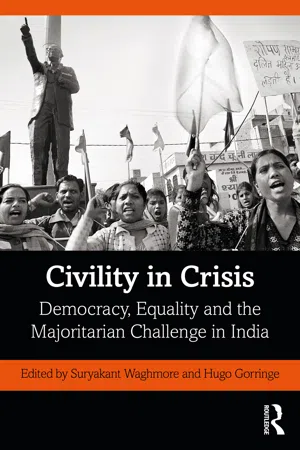
Civility in Crisis
Democracy, Equality and the Majoritarian Challenge in India
- 178 pages
- English
- ePUB (mobile friendly)
- Available on iOS & Android
Civility in Crisis
Democracy, Equality and the Majoritarian Challenge in India
About This Book
This book critically examines the relationship between civility, citizenship and democracy. It engages with the oft-neglected idea of civility (as a Western concept) to explore the paradox of high democracy and low civility that plagues India. This concept helps analyse why democratic consolidation translates into limited justice and minimal equality, along with increased exclusion and performative violence against marginal groups in India.
The volume brings together key themes such as minority citizens and the incivility of caste, civility and urbanity, the struggles for 'dignity' and equality pursued by subaltern groups along with feminism and queer politics, and the exclusionary politics of the Citizenship Amendment Act, to argue that civility provides crucial insights into the functioning and social life of a democracy. In doing so, the book illustrates how a successful democracy may also harbour illiberal values and normalised violence and civil societies may have uncivil tendencies.
Enriched with case studies from various states in India, this book will be of interest to scholars and researchers of political science, political philosophy, South Asian studies, minority and exclusion studies, political sociology and social anthropology.
Frequently asked questions
Information
1
Rural civilities
Caste, gender, and public life in Kerala
Is there an Indian Public? Multiple publics, gender, caste
Table of contents
- Cover
- Endorsement Page
- Half Title
- Title Page
- Copyright Page
- Table of Contents
- List of Contributors
- The Indian paradox: High democracy and low civility
- Chapter 1: Rural civilities: Caste, gender, and public life in Kerala
- Chapter 2: The Christian conundrum: Minority citizens and the incivility of caste
- Chapter 3: Disjunctions of democracy and liberalism: Agonistic imaginations of dignity in Bihar
- Chapter 4: To be a Hindu citizen: Politics of Dalit migrants in contemporary West Bengal
- Chapter 5: Modernity without alterity: Caste associations and Hindu cosmopolitanism in contemporary Mumbai
- Chapter 6: Towards greater civility: Public morality and transversal queer/feminist politics in India
- Chapter 7: Inter-caste accommodations and minimal civility in rural India
- Chapter 8: An uncivil city*
- Afterword*
- Index